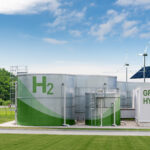U.S. liquefied natural gas (LNG) exporter Venture Global LNG this year became one of the country’s largest producers of the superchilled gas and the industry’s most contentious supplier, facing contract claims by six customers.
The duo who founded the company, co-chairs Michael Sabel and Robert Pender, have turned the booming business upside down through strong contracts, good timing and a business plan to rapidly build three giant plants.
Sabel, a former investment banker, and financial lawyer Pender, have successfully fended off accusations of self-dealing by BP, Shell, Repsol SA, Orlen, Galp Energia and Edison SpA. They oversee a business aiming to produce over 100 million metric tons of LNG.
On Monday, a U.S. energy regulator sided with customers of its first plant, ordering the pair to turn over documents showing why their initial Calcasieu Pass plant remains in a commissioning phase more than two years after startup.
At issue is the company’s insistence it does not have to supply the six because their contracts allow it to decide when the Louisiana plant is ready. Venture Global contends it is not, even though they have been selling spot cargoes since early 2022.
Shell, BP and others say the project is producing LNG above its 10 MTPA capacity and has profited to the tune of billions of dollars that belong to them. They and two others have contract arbitration claims against Venture Global.
SEIZING ON SMALL SCALE
Neither of Venture Global’s owners had any experience in LNG before starting the company. Sabel and Pender had tried unsuccessfully in 2009 to develop a coal plant in Sri Lanka, before getting the LNG bug.
They seized on LNG when considering how Haiti could import small amounts of gas for its needs. Sabel felt it could work if there were small-scale gas plants built from modular components.
“The scale had become so gigantic, risky and too expensive. So our Eureka moment was let’s bring the scale down, small enough so you can build it (processing equipment) in factories,” Sabel said in an interview last year.
They signed on with LNG equipment maker Baker Hughes, which was developing modular trains, or chillers that turn gas into a liquid, and are built in factories and snapped together like Legos to more quickly start exports.
“What they did was a modular design which enabled them, from an execution timeline, to deliver,” said Lorenzo Simonelli, CEO of Baker Hughes.
Sabel and Pender are “very driven professionals” who have succeeded with their LNG dream, he said.
To bring their vision to life, however, they needed customers willing to sign long-term contracts to convince financiers to back their plan. That led to processing deals at about $1.75 per million British thermal units, about 60% of the going rate at the time. They struck deals with BP, Edison, Galp, Repsol, Shell, and Orlen.
In a March letter to U.S. regulators, Shell said Venture Global has flouted “LNG industry norms” by turning a routine months-long startup process into years to keep cargoes for its own use.
It “has abused, and is continuing to abuse, the regulatory process to achieve its commercial objectives,” Shell wrote, pointing to the pair’s sale of 257 cargoes from a plant they claim is not ready for commercial sales.
BILLIONS IN PROFIT
The company sold that LNG on the spot market for what Shell estimated was $48.8 million per cargo, or $29 million more than if those cargoes were delivered under its contracts. Calcasieu Pass collected $7.6 billion in sales through the end of 2023, “$4.5 billion more than if sold at average prices,” it told regulators.
Venture Global CEO Sabel acknowledged its contract prices were significantly lower than others, but he said had it been able to sign deals at higher prices, it “would have helped us a lot more.”
He rejects Shell’s contention that Calcasieu Pass was built on the backs of its long-term contract holders and believes when it delivers gas to those buyers by early next year, “the issue as it relates to CP1 (Calcasieu Pass) goes away.”
(Reporting by Curtis Williams in Houston; Editing by Gary McWilliams, Marguerita Choy and David Gregorio)







